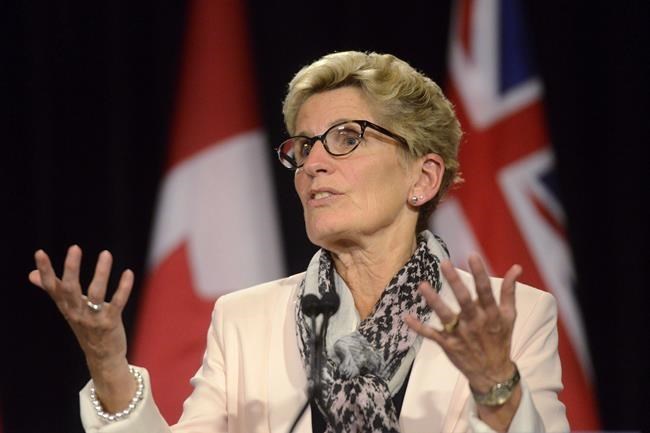THUNDER BAY - The government of Ontario is launching a basic income pilot project and Thunder Bay will be one of three cities taking part.
Premier Kathleen Wynne made the announcement in Hamilton on Monday morning. The pilot project will take place over three years to determine how a basic income could provide more opportunities for people living on a low income.
“One income used to be enough for most families,” Wynne said during the announcement. “And now, even with two people working, it’s tough to save, it’s tough to feel like you are getting ahead, and it’s tough to feel confident that your job will still be yours or still be around in five years or 10 years, or even less.”
“The project will explore the effectiveness of providing a basic income to people who are currently living on low income, whether they are working or not,” Wynne continued. “People participating in our pilot communities will receive a minimum amount each year, a basic income, no matter what.”
Thunder Bay and the surrounding area was chosen as one of three cities to take part in the pilot this spring. Hamilton will also be participating in the spring and Lindsay later on in the fall.
As part of the basic income model, eligible participants will receive up to $16,989 per year for a single person and up to $24,027 per year for a couple, less 50 per cent of any earned income. Individuals living with a disability will receive an additional $6,000 per year.
“We must do more than simply protect people’s wages and their ability to earn a good living,” Wynne said. “We must work to create a fair economy that provides opportunity and security for everyone.”
According to Wynne, the Ontario economy is in a strong position and all economic indicators are pointing in the right direction to start the pilot and assisting those with low income.
“We must make sure that hard work is rewarded with a decent pay-cheque,” she said. “We must make sure that the opportunities to our people, and especially our young people, that those opportunities not only endure, but that they grow.”
Throughout the three regions, 4,000 participants between the ages of 18 and 64 who are eligible will be randomly selected to receive basic income or be part of a control group that does not receive it. Information on how to participate will be sent to eligible participants later this spring.
“We are starting small, a three-year project in these selected communities to start, but our goal is clear - we want to find out whether a basic income makes a positive difference in people’s lives, whether this new approach gives them the ability to begin to achieve their potential and whether it is an approach that can be adopted across our province as a whole,” Wynne said.
The three-year pilot project will be evaluated by a yet to be determined third-party research consortium. City of Thunder Bay acting mayor, Iain Angus, who was present for the announcement in Hamilton, had concerns about the evaluation process.
“Can you assure us that in this one, it’s a three-year pilot, that the evaluation will be ongoing and in the event it proves what we all think it will prove, that an announcement will be made prior to the end of the three years of not only the continuation for those people who are part of the pilot, but as well as expansion?” Angus asked.
According to Wynne, the evaluation process on the pilot will be ongoing and the future of the basic income in Ontario will be determined based on a number of different factors.
“Some of the outcomes of job retention, retention in education, better health outcomes, those will take a little bit of time to demonstrate, if we see those,” she said. “That’s why it’s three years. If we could figure it out in six months, we would figure it out in six months, but it takes a bit longer than that. By the end of the three years, we will have a good idea of where it is going and be able to talk about what comes next.”
The government of Ontario is also planning a separate First Nations basic income pilot, which is still in the early stages.
